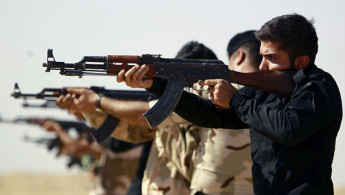Missing Americans kidnapped by 'Iran-backed' militia in Iraq
The three US citizens are being held by a Shia militia supported by Tehran, Iraqi and US sources have claimed.
2 min read
Iranian-backed Shia militias fought alongside US-led coalition and Iraqi government forces against IS [Getty]
Three US citizens abducted last week from the Iraqi capital are being held by Iran-backed Shia militias, US and Iraqi intelligence sources said on Tuesday.
The three US citizens were seized from a private residence in the Dora district of Baghdad, Iraqi officials said.
The US government "had no reason to believe" that Tehran was involved in the abductions, the source added.
"They were abducted because they are Americans, not for personal or financial reasons," an Iraqi source later added.
The three US citizens are reported to have been working for a company under a contract for the US Army.
"Gunmen in military uniforms came in five or six SUVs, they entered the building and then left almost immediately," an eyewitness reported.
Their abduction marks the first time US citizens have been kidnapped in Baghdad following the Pentagon's withdrawal of troops in 2011.
The US is working with Iraqi authorities to locate the missing Americans.
"The picture is becoming a little bit more clear in terms of what might have happened," said US State Department spokesman John Kirby during a press briefing on Tuesday.
"Without getting into details... we're working, again, very hard to try to resolve this," Kirby added.
Iran-backed Shia militias have increasingly become key players in Iraq following the collapse of the Iraqi army amid the rapid success of IS group in northern and central Iraq in 2014.
Many joined the Popular Mobilisation Committees formed in the aftermath of the IS group's taking of Mosul.
Many also have their roots in anti-US militancy following the US-led occupation of Iraq from 2003.
Despite finding common cause in the fight against the IS group, a number of the participating militias of the Popular Mobilisation Commitees have been vocal opponents of any potential return of US ground forces.
A spokesman for the "Iraqi Hizballah" militia recently promised to attack US troops if they returned.
"Any such American force will become a primary target for our group," said Jafaar Hussaini. "We fought them before and we are ready to resume fighting."
The three US citizens were seized from a private residence in the Dora district of Baghdad, Iraqi officials said.
The US government "had no reason to believe" that Tehran was involved in the abductions, the source added.
"They were abducted because they are Americans, not for personal or financial reasons," an Iraqi source later added.
The three US citizens are reported to have been working for a company under a contract for the US Army.
"Gunmen in military uniforms came in five or six SUVs, they entered the building and then left almost immediately," an eyewitness reported.
Their abduction marks the first time US citizens have been kidnapped in Baghdad following the Pentagon's withdrawal of troops in 2011.
| Read more: Iraqi security forces scramble to find kidnapped US citizens |
The US is working with Iraqi authorities to locate the missing Americans.
"The picture is becoming a little bit more clear in terms of what might have happened," said US State Department spokesman John Kirby during a press briefing on Tuesday.
"Without getting into details... we're working, again, very hard to try to resolve this," Kirby added.
Iran-backed Shia militias have increasingly become key players in Iraq following the collapse of the Iraqi army amid the rapid success of IS group in northern and central Iraq in 2014.
Many joined the Popular Mobilisation Committees formed in the aftermath of the IS group's taking of Mosul.
Many also have their roots in anti-US militancy following the US-led occupation of Iraq from 2003.
Despite finding common cause in the fight against the IS group, a number of the participating militias of the Popular Mobilisation Commitees have been vocal opponents of any potential return of US ground forces.
A spokesman for the "Iraqi Hizballah" militia recently promised to attack US troops if they returned.
"Any such American force will become a primary target for our group," said Jafaar Hussaini. "We fought them before and we are ready to resume fighting."





 Follow the Middle East's top stories in English at The New Arab on Google News
Follow the Middle East's top stories in English at The New Arab on Google News


![22 Arab countries at COP29 have rejected the targeting of fossil fuels [Getty]](/sites/default/files/styles/image_330x185/public/2024-11/GettyImages-2184289638.jpg?h=199d8c1f&itok=ptHl5bec)